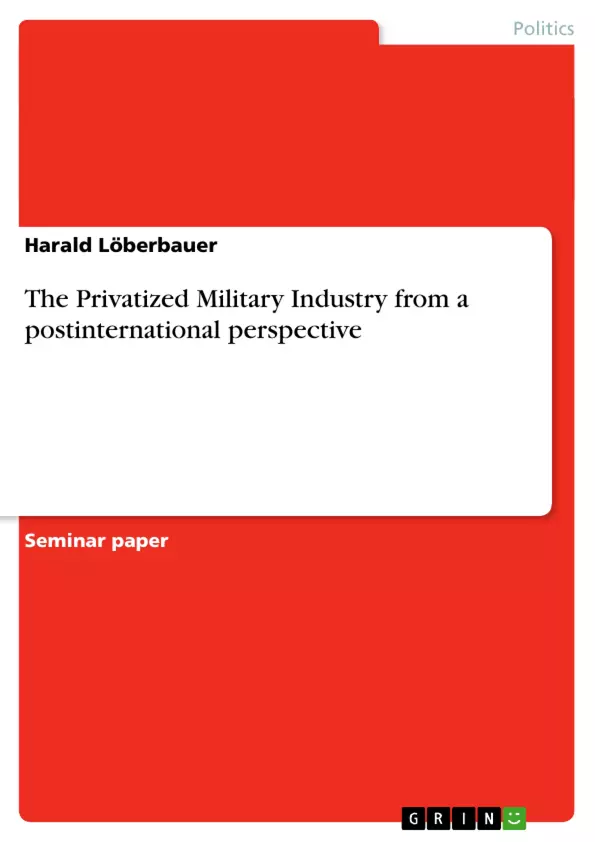The Privatized Military Industry (PMI) definitely is on the rise as P.W. Singer argued in 2004. In international relations scholarship, numerous research is available on this topic since the PMI started its rise during the 1990s. After having identified a rather “new” phenomenon in world politics, the process of the politicization and analytical analysis follows, drawing a comparison to a policy-analysis approach.
Doing research on private actors in world politics, offering services falling within the military domain, from a postinternational perspective is a rather new thing. Most researchers analyze the PMI as such, their institutional design, their organization and classify them according to the services they offer. This research is based on a different approach. It analyzes the implications of the PMI to the Westphalian state and state system by referring to postinternationalism as a worldview. What constitutes the postinternational worldview – and what indicators I will use based on this worldview – is explained in part II dealing with theory. Theory in this paper in principle can be summed up with the phrase that “the Westphalian state as such is declining in power and that private actors (in our case private military actors) such as TNCs or NGOs are becoming more important and powerful.” Some gain and some lose. From this perspective it is the states that lose and the private actors that gain.
Inhaltsverzeichnis (Table of Contents)
- I Introduction
- 1.1 Object of research and structure
- 1.2 Main questions
- 1.3 Method
- II Theory: a postinternational worldview
- III The Privatized Military Industry in theory
- 3.1 Mercenaries in evolution
- 3.2 What makes a mercenary a mercenary?
- 3.2.1 Private security and military companies
- 3.2.2 Mercenaries and 'corporate warriors'
- 3.3 A new mediaevalism: A Hobbesian or a Lockeian world?
- 3.4 PMCs classified
- 3.5 Implications of 'modern' mercenaries to the Westphalian state
- 3.5.1 Rogue firms
- 3.5.2 The responsibility gap
- IV Regulating the industry or 'losing control'
Zielsetzung und Themenschwerpunkte (Objectives and Key Themes)
This seminar paper explores the rise of the Privatized Military Industry (PMI) from a postinternational perspective. It aims to assess whether the reemergence of private actors offering military services represents a backlash to pre-Westphalian forms of politics. This analysis uses the postinternational worldview as a theoretical framework, examining the implications of the PMI for the Westphalian state system.
- The evolution of the PMI and its implications for the Westphalian model of the state system
- The concept of a "new mediaevalism" and its relationship to the PMI
- The role of mercenaries and "corporate warriors" in the PMI
- The challenges of regulating the PMI and the potential for "losing control"
- The theoretical and practical aspects of postinternationalism and its application to the PMI
Zusammenfassung der Kapitel (Chapter Summaries)
The introduction of the paper outlines the research topic, main questions, and methodology. The theoretical framework of postinternationalism is discussed in Chapter II, examining the concepts of extraterritoriality, sovereignty as a social construct, the Westphalian state system, and the importance of a monopoly of force. Chapter III provides an in-depth analysis of the PMI, exploring its evolution, the definition of mercenaries and "corporate warriors," and the implications for the Westphalian model of the state system. Finally, Chapter IV discusses the challenges of regulating the PMI and potential solutions to the problems identified in the paper.
Schlüsselwörter (Keywords)
This seminar paper focuses on the Privatized Military Industry (PMI), postinternationalism, mercenaries, corporate warriors, Westphalian state system, monopoly of force, sovereignty, extraterritoriality, regulation, and control.
Frequently Asked Questions
What is the Privatized Military Industry (PMI)?
The PMI consists of private companies that provide services traditionally handled by state militaries, ranging from logistics and training to active security and combat support.
How does the PMI challenge state sovereignty?
From a postinternational perspective, the rise of private military actors suggests a decline in the state's traditional monopoly on the legitimate use of force, shifting power to non-state actors.
What is the difference between a mercenary and a 'corporate warrior'?
While both are private actors, 'corporate warriors' operate within modern corporate structures (PMCs) with legal contracts, whereas traditional mercenaries are often seen as individual soldiers of fortune.
What is "New Mediaevalism"?
It is a theoretical concept describing a world where authority is fragmented among various overlapping actors (states, corporations, NGOs), similar to the political structure before the Westphalian state system.
What is the "responsibility gap" in the private military industry?
The responsibility gap refers to the difficulty of holding private firms accountable for human rights violations or illegal actions, as they often operate in legal gray areas outside state military law.
- Citation du texte
- Harald Löberbauer (Auteur), 2007, The Privatized Military Industry from a postinternational perspective, Munich, GRIN Verlag, https://www.grin.com/document/71957



